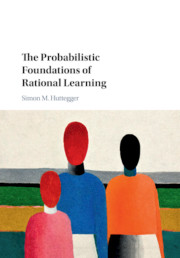Book contents
- Frontmatter
- Dedication
- Contents
- List of Figures
- Preface and Acknowledgments
- Introduction: Abstract Models of Learning
- 1 Consistency and Symmetry
- 2 Bounded Rationality
- 3 Pattern Learning
- 4 Large Worlds
- 5 Radical Probabilism
- 6 Reflection
- 7 Disagreement
- 8 Consensus
- Appendix A Inductive Logic
- Appendix B Partial Exchangeability
- Appendix C Marley's Axioms
- Bibliography
- Index
Introduction: Abstract Models of Learning
Published online by Cambridge University Press: 25 October 2017
- Frontmatter
- Dedication
- Contents
- List of Figures
- Preface and Acknowledgments
- Introduction: Abstract Models of Learning
- 1 Consistency and Symmetry
- 2 Bounded Rationality
- 3 Pattern Learning
- 4 Large Worlds
- 5 Radical Probabilism
- 6 Reflection
- 7 Disagreement
- 8 Consensus
- Appendix A Inductive Logic
- Appendix B Partial Exchangeability
- Appendix C Marley's Axioms
- Bibliography
- Index
Summary
Abstract Models of Learning
Learning is something we are all very familiar with. As children we learn to recognize faces, to walk, to speak, to climb trees and ride bikes, and so many other things that it would be a hopeless task to continue the list. Later we learn how to read and write; we learn arithmetic, calculus, and foreign languages; we learn how to cook spaghetti, how to drive a car, or what's the best response to telemarketing calls. Even as adults, when many of our beliefs have become entrenched and our behaviors often are habitual, there are new alternatives to explore if we wish to do so; and sometimes we even may revise long-held beliefs or change our conduct based on something we have learned.
So learning is a very important part of our lives. But it is not restricted to humans, assuming we understand it sufficiently broadly. Animals learn when they adjust their behavior to external stimuli. Even plants and very simple forms of life like bacteria can be said to “learn” in the sense of responding to information from their environment, as do some of the machines and computer programs created by us; search engines learn a lot about you from your search history (leading to the funky marketing idea that the underlying algorithms know more about you than you do yourself).
Thus, learning covers a wide variety of phenomena that share a particular pattern: some old state of an individual (what you believe, how you act, etc.) is altered in response to new information. This general description encompasses many distinct ways of learning, but it is too broad to characterize learning events. There are all kinds of epistemically irrelevant or even harmful factors that can have an influence on how an individual's state is altered. In order to better understand learning events and what sets them apart from other kinds of events, this book uses abstract models of learning, that is, precise mathematical representations of learning protocols. Abstractmodels of learning are studied in many fields, such as decision and game theory, mathematical psychology, and computer science. I will explore some learning models that I take to be especially interesting.
- Type
- Chapter
- Information
- Publisher: Cambridge University PressPrint publication year: 2017



